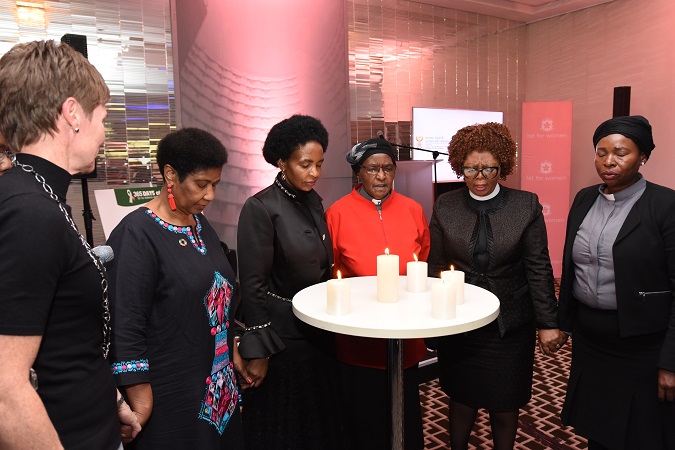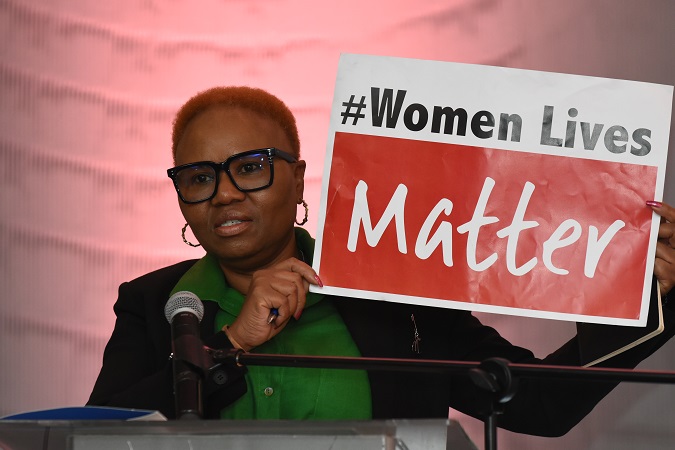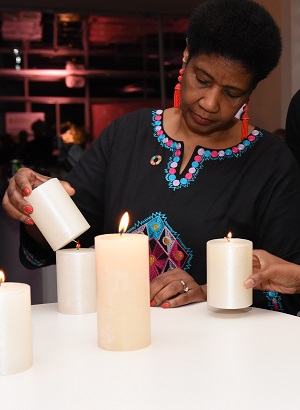South Africa launches 365 days of activism against gender-based violence and femicide on Human Rights Day
“Enough is enough. Gender Based Violence and Femicide is a societal problem that has been declared a national crisis by President Cyril Ramaphosa. It continues, unabated, despite various efforts. Together, we need to play our part, not just for 16 days but for 365 days a year, every year,”Date:

The Minister in the Presidency for Women, Youth and Persons with Disabilities, Maite Nkoana- Mashabane, officially launched the 365 Days of Activism against Gender-Based Violence and Femicide (GBVF) on 10 December 2019 in partnership with UN Women and 1st for Women Insurance.
At the launch, Minister Nkoana-Mashabane said GBVF needed constant illumination and focus. She called on all South Africans to unite and play their part in fighting this scourge. “Enough is enough. Gender Based Violence and Femicide is a societal problem that has been declared a national crisis by President Cyril Ramaphosa. It continues, unabated, despite various efforts. Together, we need to play our part, not just for 16 days but for 365 days a year, every year,” said Minister Nkoana-Mashabane.
In addition to launching a National Strategic Plan on GBVF, Government will be fostering partnerships with key stakeholders in civil society, faith-based organisations and the private sector, like 1st for Women Insurance, to mobilise citizens.
Advocate Brenda Madumise-Pajibo, Co-Chair of the Interim Steering Committee on Gender-Based Violence Femicide (which is leading the President’s Emergency Response Plan on Gender-Based Violence and Femicide), expressed hope that this intensified and coordinated action from all stakeholders would provide the breakthrough needed to end GBVF. “There has been a call from the civil society movement for many years that this struggle cannot just be for 16 days it has to be 365 days … so that there is no fragmentation and we can scale up efforts and resources because everyone has joined in the fight to end gender-based violence and femicide.”

Lindiwe Zulu, Minister Social Development- South Africa at the event. Photo: UN Women
Phumzile Mlambo-Ngcuka, Executive Director of UN Women emphasised the important of accelerating collective efforts to end gender-based violence with a focus on behaviour change. “Gender inequality, sexism and male privilege lay the foundation for all forms of violence against women and girls. Addressing these negative norms and stereotypes, including working with men and boys to promote positive masculinity, must be at the core of prevention strategies. Working together with the private sector on partnerships like this one will enable us to tackle this issue not only today, but every day of the year.”
She further urged South Africans to be relentless in their contributions to ending violence, “We work 365 days because every day a woman dies. Whatever other success we have, if we cannot go to our homes and relax, if many women meet their deaths at the hands of loved ones then nothing else matters Our freedom is meaningless, our constitution is meaningless if it does not benefit all of us, and anyone who is a bystander is giving their backs to half the population.”
Robyn Farrell, 1st For Women CEO highlighted the complexity of violence against women in South Africa based on the company’s research findings and appealed for a multifaceted and collaborative approach to address the underlying attitudes, beliefs, practices and systems that condone, justify or excuse gender inequality. “Through our research we found that male superiority and a culture of violence which manifests itself in the form of patriarchy, control, sexual entitlement and unhealthy conflict resolution skills are determining factors towards women abuse. We believe that education is a fundamental tool in the fight for gender equality.”
In 2020, the 1st For Women Foundation, which has contributed over R70 million to organisations fighting gender-based violence and assisted more than 90,000 victims and survivors of violence, will pilot a school-based learning programme at 20 registered Early Childhood Development (ECD) Centres and five primary and high schools in the Diepsloot community for children aged three to 18.
The event was also used to motivate South Africans, particularly men, to visibly take a stand against all forms of abuse and GBVF by signing the National Pledge on Gender-Based Violence and Femicide and joining www.for-women.co.za – a hub for survivors and victims of GBVF who need help and corporates who can offer help.

“The National Pledge calls on South African men to become actively involved in ending all forms of violence. It is not only about being a good man, father, husband and co-worker. It goes beyond that to men not allowing violence in all its forms to take place. Men can do this by calling out other men who insult, denigrate, abuse, or treat women like objects. Men need to be active players in efforts to end GBVF,” said Minister Nkoana-Mashabane.
Know and Share these contact details:
- GBV Command Centre: 0800 428 428 / *120*7867# from any cell phone
- Persons with disabilities, SMS ‘help’ to 31531
- Women Abuse Helpline: 0800 150 150
- Child line: 0800 055 555
- SAPS Crime Stop: 0860 10111 / SMS Crime Line: 32211
- GBVF-related service complaints (SAPS): 0800 333 177
- [ Click to reveal ]
- National AIDS Helpline: 0800 012 322
- National Human Trafficking Helpline: 0800 222 777
- Suicide Helpline: 0800 567 567
- For-Women:www.for-women.co.za